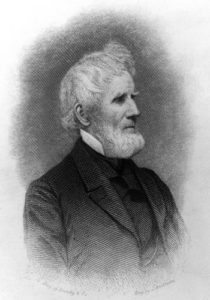
Arthur Tappan
*Arthur Tappan was born on this date in 1786. He was a white-American businessman, philanthropist, and abolitionist.
Arthur Tappan was born in Northampton, Massachusetts, to Benjamin Tappan and Sarah Homes Tappan, a great-niece of Benjamin Franklin. He was the brother of Ohio Senator Benjamin Tappan, abolitionist Lewis Tappan, and a great-grandfather of Thornton Wilder. They were devout Calvinists. He moved to Boston at the age of 15. In 1807, he established a dry goods business in Portland, Maine. In 1826, a year after the completion of the Erie Canal, he and his brother Lewis moved to New York City, the new national business and retail trade center, where they established a silk importing company. 1827, the brothers founded the New York Journal of Commerce with Samuel Morse.
Arthur and his brother were successful businessmen, but commerce was never their initial interest. They viewed making money as less important than saving souls. They made the Journal of Commerce a publication free of "immoral advertisements." Arthur Tappan's summer home in New Haven, Connecticut, was destroyed by a mob in 1831 (along with a black hotel and a black house) after he supported a surprisingly unpopular college proposal for blacks in that city. Both men suffered in the anti-abolitionist riots of 1834, in which mobs attacked their property.
Arthur Tappan was one of two signatories who issued a disclaimer on behalf of the American Anti-Slavery Society, of which he was president, in the aftermath of the riots, emphasizing its dedication to abolishing slavery within the existing laws of the United States. Tappan was also a journalist. In 1836, the first issue of the children's magazine of the AASS, The Slave's Friend, saw print. "In the great commercial crisis of 1837, he suffered immense losses, and the Tappans closed their silk-importing business, and almost their paper, but the brothers persevered. Thirty-eight magazine issues were produced, with the final issue published in 1838.
In the 1840s, they founded another lucrative business enterprise when they opened the first commercial credit-rating service, the Mercantile Agency, a predecessor of Dun and Bradstreet. Arthur Tappan died on July 23, 1865. After his death, Arthur was described thus by his friend and educational collaborator Theodore Dwight Weld, who called him one of humanity's "great benefactors":
So simple in all his tastes and habits, so quiet and modest, yet so firm, independent, and conscientious, that nothing could swerve him from the right — so careful and deliberate in forming conclusions, yet instant and indomitable in executing. Economical in spending, yet always bountiful in giving. So faithful and true, so scrupulously just in all things. Never seeking his own; of few words, each straight to the point, and that a deed, and how often a great one; so earnest in daring for the weak against the strong.